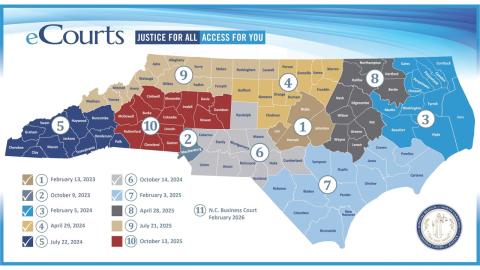Eastern North Carolina Completes eCourts Conversion
Article contents

Eleven counties convert to eCourts this month and complete eastern North Carolina’s transition to online access to justice for the public.
Track 8 of the eCourts conversion includes Bertie, Edgecombe, Greene, Halifax, Hertford, Lenoir, Nash, Northampton, Pitt, Wayne, and Wilson counties.
North Carolina is a leader in converting court operations for every case type solely to the cloud. The state pioneered the transition to a centralized, accessible, and secure SaaS solution that integrates all case types and criminal processes in every county in the cloud.
For over 200 years, the Judicial Branch has been paper-driven, requiring the public to file in paper and search paper records during business hours. Now, eCourts delivers the convenience and accessibility of always-on services expected in the information age. The eCourts Guide & File application helps the public create and file the most common legal actions through assisted interviews.
More than 1.5 million digital searches are conducted monthly through the eCourts Portal, saving citizens countless trips and calls to the courthouse for simple case information and documents previously unavailable online.
eCourts' transformation of decades-old mainframe applications and paper files to modern technology connects North Carolina counties in one integrated system accessible to the public online. The state has advanced from laggard to leader in 21st century case management systems in the United States.
The transition to advanced technology infrastructure for eCourts also strengthens the Judicial Branch’s cybersecurity, disaster recovery, and data storage capabilities. The eCourts system has accepted more than 3 million electronic filings in North Carolina.
“North Carolina communities deserve convenient digital services for swift resolution of their legal needs,” said NCAOC Director Ryan S. Boyce. “Our state’s shared commitment to empowering the public with online access to justice through digital court operations is transforming our jurisdictions into national leaders for the delivery of modern legal services.”
As eCourts expands statewide, millions of North Carolinians gain mobile access to their courthouse, saving time and providing transparency. In addition to electronic filing and records searches, the eCourts suite of applications also includes the already statewide eWarrants and Enforcement Mobile platforms, which integrate law enforcement processes with the court system. Some of the benefits of this generational change include:
- Empowering the public to access and file records with the justice system online 24/7 instead of only inside courthouses during business hours.
- Reducing travel time through shared digital access to records and remote hearings.
- Integrating with public safety systems to help court officials and law enforcement access critical information through connected applications.
- Assisting users in drafting and filing the most common legal actions through the Guide & File automated interview service.
- Replacing printed forms and records with electronic workflows to save millions of sheets of paper and valuable courthouse space.
- Standardizing court business processes to promote consistency statewide.
- Reducing the number of returned forms that are filled out incorrectly in paper, resulting in court delays for litigants.
- Updating hardware infrastructure, network bandwidth, and wireless connectivity in courthouses for court officials and the public.
- Providing on-demand training resources, videos, guides, and live introductory sessions presented both in-person and online.
- Updating cybersecurity and data recovery capability systems from obsolete mainframe technology to cloud-hosted infrastructure.
- Streamlining judicial officials’ access to case data, dockets, and calendars in or out of the courtroom.
- Reducing phone calls and in-person visits to customer service counters, freeing up court staff to handle complex issues for customers.
- Centralizing a statewide financial management system to facilitate more convenient and timely payments to the court system.
A large network of IT and software systems teams from NCAOC supports the eCourts transition through training, on-site assistance, remote monitoring, and help desk response. Preparations and walkthroughs for each track of the eCourts transition begin months in advance to train court officials and the public on new technologies and processes, install improved network infrastructure in courthouses, program custom integrations, and migrate case event data and court records from mainframe indexes and paper to a dynamic cloud-hosted platform.
Register for eCourts trainings and access education materials, screenshot reference guides, FAQs, and other resources supporting the transition, at NCcourts.gov/eCourts.
More Information
- eCourts Training Resources and Track 9 Transition Information
- eCourts is Now Live in 11 More Eastern Counties
- eCourts Track 8 Go-Live Timeline and Transition Process Starts April 16, 2025
- eCourts Training Resources and Track 8 Transition Information
- Training Available for Attorneys and Judicial Partners Through April 2025